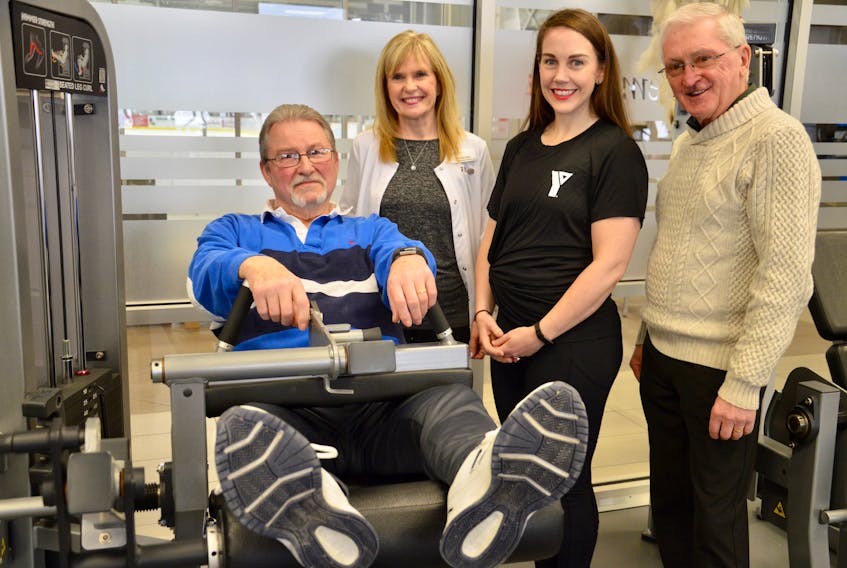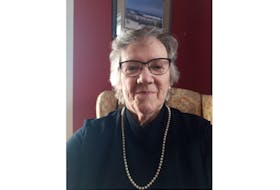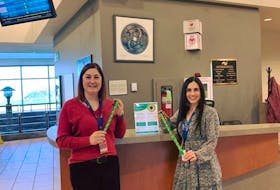Ask Joe Mombourquette what his favourite exercise is at the Membertou YMCA and he’ll point to the rowing machine.
But today it’s in use so the 73-year-old Catalone resident doesn’t hesitate to head towards the seated leg curl machine, where, under the supervision of personal trainer and manager of programs for the Cape Breton Family YMCA Janice Curnew, he does a series of exercises. It's all part of his regular fitness routine that he undergoes three times a week but it’s a long way from October 2016, when Mombourquette had a heart attack.
“I feel great now,” said Mombourquette, who admits he wasn’t even sure what those pains in his left shoulder were when he started having them that fall night a few years ago. But he does know now that it’s not something he ever wants to feel again.
“All of a sudden I got a pain in my left shoulder and I said to my wife, I think there’s something wrong here,” he recalled on Tuesday at the Membertou Y. “And she said you just did too much today … anyway to make a long story short I said no, no, this is different — the pain here is unreal.”
They called 911 and he was taken to Cape Breton Regional Hospital in Sydney where he was told he had taken a heart attack.
“I was 70 years old then and I thought, well I’m getting close to the end and it didn’t surprise me,” he said.
But over the next three years, his attitude changed considerably, thanks to a program that encourages patients to keep exercising.
“Since going into this program I feel a lot better and I’ve dropped about 20 pounds,” said Mombourquette. “I went from being able to do next to nothing to being able to do quite a bit. It’s actually paying off.”
According to Patricia Chant, a nurse in the heart lung wellness cardiac rehab, those who have had heart attacks, bypass surgeries and stints go through a 12-week cardiac program where they learn about cardiac disease, better nutrition and begin exercise programs.
“A lot of our clients really enjoy the program and they really learn a lot — it’s all about healthy lifestyles and healthy living and to see how they can live with heart disease and improve their numbers like get their blood pressure to target, their cholesterol levels to target, and their blood sugars, their A1Cs, all to target level.”
But once the 12 weeks were over, patients were left on their own to maintain their newly acquired fitness habits, which didn’t always continue because of the patients’ own fears, says cardiologist Dr. Rick Bedard.
“One of the most common problems with patients who have cardiac events is fear,” said Bedard. “Fear of movement, fear of exercise, fear of doing anything, thinking anything they do might increase their risk of having another heart attack. That is not the case. It’s the exact opposite — physical exercise is a way to stave off further cardiac events.”
The cardiac wellness program was developed with the YMCA to quell those fears and to keep these patients exercising, ensuring their long-term health. Curnew says since the program began in January 2017, between 120 and 130 people like Mombourquette have taken part.
“We take the patients after they’ve done a 12-week program up at the heart and lung clinic and we take what they’ve learned on the fitness side of things,” said Curnew. “They have a whole education program that is absolutely fantastic and we just expand on the fitness knowledge behind that. We want to have those patients to have somewhere to go at the end of their 12 weeks when they’re up at the clinic … So we show them how to use the gym equipment, what’s safe, what’s not safe, how to keep their heart rate within a target heart rate zone with their cardio and that kind of thing.”
For Bedard, the program is welcomed because it helps keep his patients in better physical condition and hopefully less likely to end up back in the hospital.
“Before this program was started, a lot of the patients at the end of the 12 weeks, would have nowhere to go and would fall off the wagon as far as their ability and their desire or incentive to exercise,” said Bedard. “There are many beneficial sides of exercise and fitness beyond just feeling well.
“It’s a useful tool in the toolbox for promoting health, especially after people have had a cardiovascular event.”
For Mombourquette, it was just what the doctor ordered. Stronger and more fit, he feels much healthier.
“The whole thing is great and more people should, if they have a heart attack or respiratory problems, they should follow their instructions and they’ll benefit from it.”








